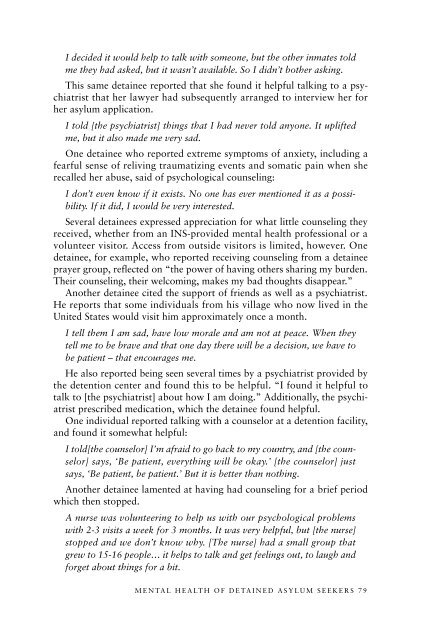From Persecution to Prison - Bellevue/NYU Program for Survivors of ...
From Persecution to Prison - Bellevue/NYU Program for Survivors of ...
From Persecution to Prison - Bellevue/NYU Program for Survivors of ...
You also want an ePaper? Increase the reach of your titles
YUMPU automatically turns print PDFs into web optimized ePapers that Google loves.
I decided it would help <strong>to</strong> talk with someone, but the other inmates <strong>to</strong>ldme they had asked, but it wasn’t available. So I didn’t bother asking.This same detainee reported that she found it helpful talking <strong>to</strong> a psychiatristthat her lawyer had subsequently arranged <strong>to</strong> interview her <strong>for</strong>her asylum application.I <strong>to</strong>ld [the psychiatrist] things that I had never <strong>to</strong>ld anyone. It upliftedme, but it also made me very sad.One detainee who reported extreme symp<strong>to</strong>ms <strong>of</strong> anxiety, including afearful sense <strong>of</strong> reliving traumatizing events and somatic pain when sherecalled her abuse, said <strong>of</strong> psychological counseling:I don’t even know if it exists. No one has ever mentioned it as a possibility.If it did, I would be very interested.Several detainees expressed appreciation <strong>for</strong> what little counseling theyreceived, whether from an INS-provided mental health pr<strong>of</strong>essional or avolunteer visi<strong>to</strong>r. Access from outside visi<strong>to</strong>rs is limited, however. Onedetainee, <strong>for</strong> example, who reported receiving counseling from a detaineeprayer group, reflected on “the power <strong>of</strong> having others sharing my burden.Their counseling, their welcoming, makes my bad thoughts disappear.”Another detainee cited the support <strong>of</strong> friends as well as a psychiatrist.He reports that some individuals from his village who now lived in theUnited States would visit him approximately once a month.I tell them I am sad, have low morale and am not at peace. When theytell me <strong>to</strong> be brave and that one day there will be a decision, we have <strong>to</strong>be patient – that encourages me.He also reported being seen several times by a psychiatrist provided bythe detention center and found this <strong>to</strong> be helpful. “I found it helpful <strong>to</strong>talk <strong>to</strong> [the psychiatrist] about how I am doing.” Additionally, the psychiatristprescribed medication, which the detainee found helpful.One individual reported talking with a counselor at a detention facility,and found it somewhat helpful:I <strong>to</strong>ld[the counselor] I’m afraid <strong>to</strong> go back <strong>to</strong> my country, and [the counselor]says, ‘Be patient, everything will be okay.’ [the counselor] justsays, ‘Be patient, be patient.’ But it is better than nothing.Another detainee lamented at having had counseling <strong>for</strong> a brief periodwhich then s<strong>to</strong>pped.A nurse was volunteering <strong>to</strong> help us with our psychological problemswith 2-3 visits a week <strong>for</strong> 3 months. It was very helpful, but [the nurse]s<strong>to</strong>pped and we don’t know why. [The nurse] had a small group thatgrew <strong>to</strong> 15-16 people… it helps <strong>to</strong> talk and get feelings out, <strong>to</strong> laugh and<strong>for</strong>get about things <strong>for</strong> a bit.MENTAL HEALTH OF DETAINED ASYLUM SEEKERS 79



